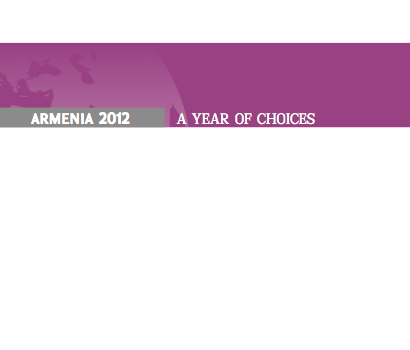
 This is the fifth year that Civilitas looks back at the year past and attempts to assess the events and trends within Armenia, and around us. It is always a challenge not to reduce this annual publication to a list of events. The intent is to focus on trends and institutional change. Each year, however, it becomes harder to say something new given the slow process of institutional change.
This is the fifth year that Civilitas looks back at the year past and attempts to assess the events and trends within Armenia, and around us. It is always a challenge not to reduce this annual publication to a list of events. The intent is to focus on trends and institutional change. Each year, however, it becomes harder to say something new given the slow process of institutional change.
2012 was different only in that there were more choices to be made — by the people and by the rulers. Neighbors to the north made those choices and are living with the consequences, sometimes surprising, but comfortable in the knowledge that the choices were theirs.
In Armenia, in a year that was both an election year and a pre-election year, there were choices to be made by the various political players — to seriously collaborate and compete, or to do the minimum necessary to remain a player. There were choices for the ruling party — to prepare for elections by responding to electors’ needs or merely pretending. There were choices for those in government — to nurture a competitive economic environment with room for everyone, or to focus on limiting the field and collecting the crumbs. There were similar choices to be made by the business elite — to profit legally and contribute to the public sector, or to continue to profit illegally and live at the expense of the public sector. Within the neighborhood and on the global stage, the choices were between visionary engagement and reactive rhetoric. Finally, the active segment of the public, too, had choices to make — which battles to fight, which alliances to make.
In the resultant disappointed environment, the people, too, made choices. They had two ways of responding to disappointment. The Economist Albert Hirschmann said either ‘with their feet or by staying put and complaining.’ This year, many chose the first. Those who chose the second did so half-heartedly, without hope.
With two exceptions. First, those seeking greater political power and responsibility managed to get past the inability and plain refusal to reach out and collaborate with others seeking change, albeit differently. Second, a small new group, who proudly claimed no interest in politics, nevertheless were both vocal, active and demanding.
There will be more choices to make in the year to come — in Armenia and Azerbaijan and Georgia. Then, the peoples in each of these societies will have to demonstrate that they want the right to make choices and will defend that right.
